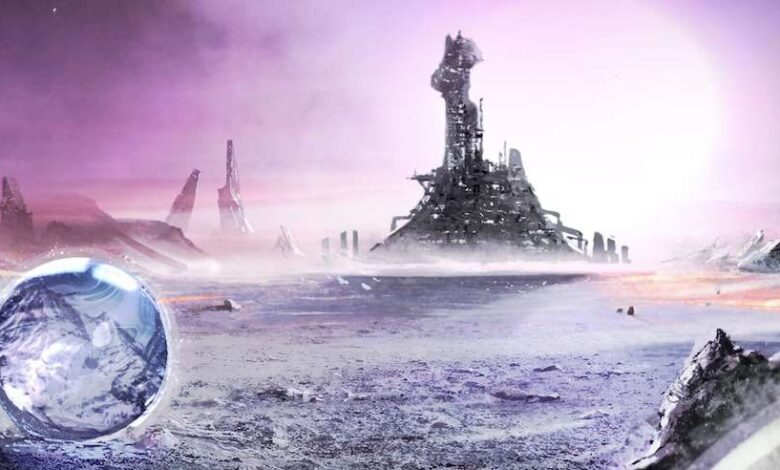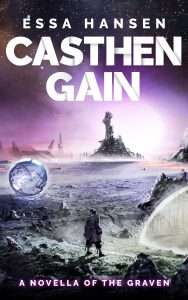INTERVIEW: author Essa Hansen – Grimdark Magazine

Essa Hansen grew up in the beautiful wildernesses of California, from the coastal foothills to the Sierra Nevada mountains, and then the Canadian Rocky Mountains, before settling back at the California coast. She has ranched bison and sheep, trained horses, practiced Japanese swordsmanship, and is a licensed falconer. By day she works as Nia Hansen for Skywalker Sound as a sound designer on science fiction and fantasy films for clients such as Marvel, Pixar, and Disney Animation. We were very excited to be able to catch up with her and chat about her new novella Casthen Gain, the world of The Graven, and what she’s getting up to next.
[GdM] Hi Essa, thanks for chatting. Your new novella Casthen Gain, a prequel to your sci-fi trilogy The Graven, comes out on 28 July from Grimdark Magazine, the very people interviewing you now, in a pleasingly circular development. Can you give us a quick rundown of what it’s about and whether readers unfamiliar with the unfathomable genius of The Graven can still pick this up?
[EH] Thank you for inviting me to chat! It’s been great fun revisiting the bubble multiverse of The Graven trilogy. Although Casthen Gain contains cameos and hidden gems for readers of the trilogy, grasping them isn’t necessary to enjoy this standalone story.
Casthen Gain straddles the line between science fiction and fantasy as it follows Sentace Ketch, a multiversal chef thrown into a battle royale hunt for a mysterious energy on an overgrown and dangerous planet in the vein of Scavengers Reign. The arsonist revolutionary he’s been chasing could be his salvation or a death wish, and complicates the game in ways he wasn’t expecting. Add an adorable fluffy alien companion and a squid-thing in a skull jar and you’ve got a weird little found family that I hope readers fall in love with as much as they did the trilogy’s found families.
[GdM] What made you want to jump back into the world of The Graven, and why this prequel story in particular? Was there a particular reason you wanted to explore everyone’s favourite morally grey, ruthless, mulitverse organisation The Casthen?
[EH] For a long time I’ve been wanting to write a story about a chef character traveling through dangerous lands, and also wanting to answer some of the questions that The Graven didn’t get around to. Over time, those two concepts merged. In the bubble multiverse, physical laws are different within each “bubble” area of space, meaning materials change in various ways as they pass through bubble borders: the perfect situation for imaginative cuisine, literally transforming ingredients and cooking them using physics translations.
The Casthen organization has been around for ages, so it was a logical anchor point for a prequel story. (I wanted to cameo everyone’s favourite morally grey, ruthless badboy Threi during his younger decades with the Casthen, but the timeline proved too finicky.) I intended this novella to highlight some of the same themes as The Graven, ones that naturally crop up around the Casthen organization: questions of autonomy, moral dilemmas from different perspectives, win/lose choices around morality and ethics, corrupt systems and the capacity for goodness to exist despite them, and whether one can use the enemy’s resources for a cause that’s just. Besides all that, the Casthen is where the discards of the world end up (and are exploited), and Sentace is just that.
[GdM] Battle royale is a very particular genre with a set of well-known grim tropes. What made you want to give it a go—and were you influenced by any previous battle royale stories?
[EH] A novella length story wasn’t going to give me time to properly lay out a battle royale plot with the complexity or ensemble cast of stories like the 2000 cult classic Battle Royale, or Alice in Borderland, or the more recent Squid Games. At least, not unless I made the battle royale the entire story. In Casthen Gain, it’s more of a backdrop—one that perfectly fits the Casthen’s way of operating. It hits the right themes for this story: survival through dangerous environments alongside an exploration of grey morality and relationship dynamics under high tension. My favourite part of the genre is the inherent unpredictability of individuals pushed to the brink of stress and exhaustion. A wild creativity becomes possible, with characters surprising themselves and the audience with their choices. In Casthen Gain, I started with a protagonist at a pivot point in his life where he’s ready to become someone new but isn’t quite sure who that is…and the stressors of this survival genre were the perfect place to put his becoming to the test.
[GdM] You’ve done something very interesting with this story, which is that you’ve kept a lot of the grimdark brutality of battle royale but added in what you could call a few cosy elements, including extended scenes of bubble universe cooking [which will make glorious sense when you read it, reader]. I call this cozy grimdark… where did the cooking element come from?
[EH] I seem to fall into this rhythm with every story I write: periods of high tension, stakes, action, and hurt, followed by the quiet, slow, intimate moments of comfort and healing. Then back again, in juxtapositions of brutal and beautiful. I enjoy reading this rhythm as well.
Across cultures, cooking is one of the quintessential ways to show care, to nourish, to bring together, to repair. In The Graven, I wrote a character—Ksiñe, the gastronomist and medic of the crew—who communicates primarily through food, and here too I wanted to explore food as a language, a syntax of peace-offering, of care, strengthening, and acknowledgment. Alongside that, battle royale is a survival genre, and survival requires nourishment. You can’t expect to be efficient in combat or mental clarity or navigating long distances if your whole system isn’t fuelled. I wanted to write a protagonist who understands this. I feel like I rarely see it highlighted in the SF/fantasy genre.
[GdM] This is a very food-based story, so inevitably I’m going to now ask you to provide your favourite/dream three-course meal.
[EH] This may sound like I’m evading the question, but I’m more of a mood-based consumer (with media too!) than one with firm favourites, so genuinely I think the dream meal for me would be to leave it up to the chef to surprise me, but this chef can perceive or intuit exactly what I need in that moment. This is how Sentace cooks for his clientele, different species and cultures from all across the multiverse.

[GdM] It’s been a couple of years since The Graven trilogy concluded. Fans of The Graven tend to eulogise it and call it one of the best modern-day sci-fi series. Looking back, how do you feel about that series, good and bad, in terms of how you think of it, how others think of it, and how it’s affected your life?
[EH] It’s strange looking back on work that’s three…five…seven years old. I’ve grown immensely through those books and since them, so reading old work can be quite cringe! Mostly I remember being extremely rushed at every stage of the trilogy, like setting track out in front of a speeding train, writing during the leftover hours of the day around a full time job and life’s stressors. The first book debuted in 2020 when the beginning of the pandemic shut the industry down, bookstores were closed, books were abandoned by their teams, and many people—myself included—were locked down alone for months, completely burnt out.
Despite the rough start and middle and end of the process, I’m very proud of my effort, of finishing, and of surviving it in every sense of that word. I stand by the ideas of the series and what I was attempting to convey, and my fans who really “got” the story are one of the best things about the whole experience for me. They kept me going during the days when it felt impossible to finish.
[GdM] Moving on to your life outside writing, you have what I think it’s fair to say is a pretty cool-sounding job: sound designer for Skywalker Sound for clients such as Marvel, Pixar, and Disney Animation. You’ve worked on Ant Man, Jurassic World, Big Hero 6, Avengers Endgame, the list goes on. Can you give us a sense of what that job entails?
[EH] It is pretty cool! Especially since I get to work in my favourite genres. As a sound designer, I guide the sonic aesthetic of the film by managing the sound effects team and coordinating with the filmmakers, but mostly I’m creating bespoke sounds from scratch: all of the emotional, surreal, or fantastical sounds we cannot record in real life, such as strange creatures, superpowers, spaceships, aliens, magic, and dreamy sequences. I take an organic approach, which involves manipulating and layering recordings of real materials to make something that feels realistic but also sounds otherworldly, exotic, or high tech.
I also do a lot of sound effects editing, which is like painting but with sound, and has a temporal aspect like music. I love the combination.
[GdM] What’s the most challenging sound you’ve had to recreate, or edit? Very much hoping that’s not the most stupid question you’ve ever been asked, but time will tell.
[EH] It’s not at all a stupid question—I get asked this in pretty much every audio interview! Currently the most challenging sound I’ve had to design is the “time shard spears” from Marvel’s Doctor Strange, which are swords made from rips in spacetime itself. The challenge was threefold. For one, I had no visuals or other descriptors besides the name when I started designing, so I was creating off of pure imagination. Two, once we received visual shots, the visual effects ideas continued to evolve, so what might seem like glass at first would become liquid or air, then vibration, perhaps back again. Visual effects intensive films are always a challenge for this reason. Thirdly, it can be very difficult find the right language to discuss sound concepts creatively (for example, “warpy” might conjure a different sonic idea to different people), and that’s exacerbated when the object or event itself is also difficult to describe, as happens often in these genres (like spacetime tearing).
[GdM] You’re also an accomplished swordswoman, rancher, horse trainer, and falconer, to name but a few. How do you choose these random cool things to learn – do you have a grand polymath plan, or do you just wander into them? I’m asking as someone who’s only good at video games.
[EH] I wander into my hobbies, but since I love animals, the outdoors, and crafts, that tends to prescribe me all the fantasy genre hobbies. I would do even more things if I had the time—get back into archery at least—but my free hours have shrunken over the years. Also yes to video games…I’m behind on so many!
[GdM] As someone for whom writing is not the only creative thing in their life, how much importance do you ascribe to it—do you hope to have a lifelong career in it, or would you be fine with it falling away? And do the stresses and problems with modern-day publishing and the increasing difficulties for authors to make careers in it ever influence your thinking in this regard?
[EH] I would love to have a lifelong career as a writer—or at the very least add something meaningful and unique to my genres. I’ve been writing stories and worldbuilding for as long as I can remember, and will continue to do so for the pure joy of the creative process. As you mentioned, the current issues with publishing take out of my hands much of my career, my titles’ visibility and performance, and how I’m treated as an author. Most days it feels like all I can do is continue to write stories that I love and that hold meaning, and hope they’ll find an audience who loves them too.
[GdM] Finally, what can you tell us about your future writing plans? Any new plans to dive back into The Graven? Or any new series in the wings?
[EH] The Graven is done for now! Or at least there is nothing more on the horizon.
I’m currently working on a standalone cross-genre novel that blends the expansive weirdness of Inception, the tranquil horror of Annihilation, and Iain M. Banks’s inclusive world of The Culture. The story leans into my brand of unique and beautiful spectral worlds filled with broken characters who have to break themselves more in order to repair themselves and their world. I hope it finds a home and heads into readers’ hands one day.
Read Casthen Gain by Essa Hansen
Source link


